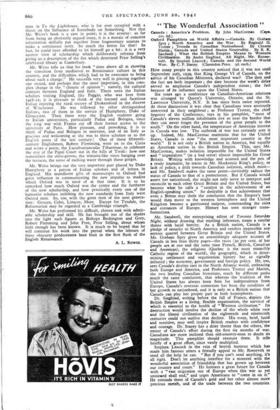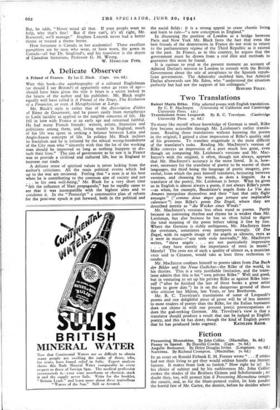" The Wonderful Association "
Oxford Pamphlets on World Affairs :—Canada. By Graham Spry North America and the War. By Reginald G. Trotter ; Trends in Canadian Nationhood. By Chester Martin • Canada and United States Neutrality. By B. K. Sandwell ; What the British Empire Means to Western Civilization. By Andre Siegfried. All Right, Mr. Roose- velt. By Stephen Leacock; Canada and the Second World War. By C. P. Stacey. (Clarendon Press. 3d. each.)
How many people in this country noticed that it was not until September toth, 1939, that King George VI of Canada, on the advice of his Canadian Ministers, declared war? The date and the fact are both important ; the date because the week's delay served to emphasise Canada's independent status ; the fact because of its influence upon the United States.
Six years ago a conference on Canadian-American relations was arranged by Queen's University, Ontario, and the St. Lawrence University, N.Y. It has since been twice repeated. At these discussions it was clear that Canadians were anxiously interested in their neighbour ; as Professor Trotter, the chief begetter of the Conference, says in his pamphlet, " most of Canada's eleven million inhabitants iive so near the border that they can never forget the presence of the great people to the south." On the other hand, the temperature of American interest in Canada was low. The outbreak of war has certainly sent it up. Indeed, Mr. MacCormac maintains that for the United States, Canada is now " the most important country in the world." It is not only a British nation in America, but equally an American nation in the British Empire. This, says Mr. MacCormac, makes isolation impossible for the United States and " imperialism " (in a bad sense) almost impossible for Great Britain. Writing with knowledge and acumen and the pen of a ready journalist, he traces in Mr. Mackenzie King's policy, or lack of policy, a drift towards _Canadian isolation, which must— and Mr. Sandwell makes the same point—inevitably reduce the status of Canada to that of a protectorate. But if Canada would assert her nationhood, she might not only serve to interpret and reconcile to each other Great Britain and the United States, but become what he calls a " catalyst in the achievement of an English-speaking union." So desirable is that achievement that even a Briton may thole the conclusion that the Empire's base would then move to the western hemisphere and the United Kingdom become a garrisoned outpost, commanding the exits and entrances of Europe. History has seen stranger trans- formations.
Mr. Sandwell, the enterprising editor of Toronto Saturday Night, without drawing that startling inference, treats a similar theme with lucid brevity. As a British nation, Canada is a pledge of security to North America and renders impossible any serious quarrel between Great Britain and the United States. Mr. Graham Spry gives an astonishingly adequate account of Canada in less than thirty pages—the races (3o per cent, of her people are at one and the same time French, British, Canadian and American), the religions (Quebec is the most staunchly Catholic region of the world), the geography, which in deter- mining settlement and organisation history has so signally defeated ; the economy, government and foreign policy. He, too, sees Canada's destiny cast in the North Atlantic world, embracing both Europe and America, and Professors Trotter and Martin, the two leading Canadian historians, reach by different paths much the same conclusion, that whereas the tradition of the United States has always been firm for independence from Europe, Canada's overseas connexion has been the condition of her growth to nationhood, and it is only as a British nation that Canada can play her proper part in both hemispheres.
Dr. Siegfried, writing before the fall of France, depicts the British Empire as a living, flexible organisation, the survival of which is essential to the health of " Western civilisation." Its destruction would involve the decline of the whole white race and the liberal civilisation of the eighteenth and nineteenth centuries could not outlive that decline. His essay, brief, lucid and sensitive, may well inspire British readers with confidence and courage. Dr. Stacey has a drier theme than the others, the extent of Canada's effort during the first six months of war. Canadians are more inclined than old-country-men to doubt its magnitude. This pamphlet should reassure them. It tells briefly of a great effort, since vastly multiplied.
Stephen Leacock in the vein of boyish humour which has made him famous utters a friendly appeal to Mr. Roosevelt to send all the help he can. " But if you can't send anything, it's all right. Don't let anything interfere for a moment with the wonderful association of friendship that has grown up between our country and yours." He foresees a great future for Canada with a " vast migration out of Europe when this war as yet unnamed shall end," and urges Americans to " come in on it." He reminds them of Canada's gold and her other almost more precious metals, and of the trade between the two countries.
But, he adds, " Never mind all that. If your people want to help, why that's fine! But if they can't, it's all right, Mr. Roosevelt, we'll manage." Stephen Leacock never had a better theme or treated a theme better.
How fortunate is Canada in her academics! These excellent pamphlets are by men who wear, or have worn, the gown in Canada—all but Dr. Siegfried's, and his translator is the doyen of Canadian historians, Professor G. M. Wrong.
W. HAMILTON FYFE.



























 Previous page
Previous page